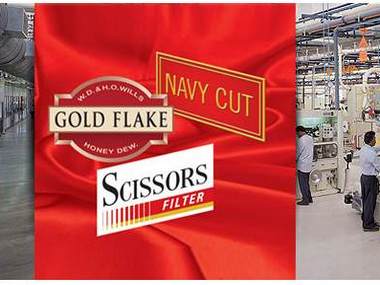Everyone seems to agree that fast-moving consumer goods stocks are too expensive. In the past 12 months, the BSE FMCG index has gained 17.4 percent against a 4.6 percent fall in the Sensex. In the immediate past though, the rally
[caption id=“attachment_234316” align=“alignleft” width=“380” caption=“Screengrab/itcportal.com”]
 [/caption]
[/caption]
in consumer goods stocks has slowed modestly: in the past three months, the FMCG index has climbed by slightly more than 1 percent, while the Sensex has generated close to 5 percent in returns.
It’s difficult to tell if the turbo-charged rally in FMCG stocks is well and truly over. Indeed, it might not be too late: a recent Firstpost story has already pointed out that it is now time for investors to ditch Hindustan Unilever and switch to ITC. But, is now the right time to buy ITC?
Consider the chart below.
[caption id=“attachment_234166” align=“alignnone” width=“426” caption=“Source: JP Morgan”]
 [/caption]
[/caption]
According to a JP Morgan report, in the one month leading to the Budget, ITC has given negative or flat returns seven times in the past ten years. That’s because every year, there are fears about a hike in excise duties on cigarettes. The cigarettes business fetches 80 percent of the company’s profit at the operating level. However, in the one month after the Budget, historically, ITC’s stock generated positive returns seven out of ten times.
Since the excise duty on cigarettes was not hiked last year, there is growing speculation that the government could announce it this year. The consensus seems to be a 10 percent hike in excise duty, which should lead to a hike in retail prices. Apart from excise, the company also has to pay substantial value added tax to state governments which differ from one state to another. In 2010-11, excise was raised by 9-18 percent across various types and sizes of filter cigarettes. Over the past two years, the average VAT paid by the company rose from 12.5 percent to 18.2 percent. But given the strong brand loyalty and pricing power, ITC’s cigarette volumes have not dropped sharply as consumers continued to puff away the company’s brands despite higher prices.
Impact Shorts
More ShortsThe JP Morgan report showed that in 2008, when cigarette prices were raised 24 percent, volumes declined by just 1 percent; more recently, when prices were increased 18-20 percent in 2011, volumes declined by a mere 2.8 percent.
Even in years of excessive tax hikes - financial years 2006, 2008, 2009 and 2011 - ITC’s shares recovered their losses within three months of the Budget announcements.
Even in the case of a hike in VAT, there’s a limit on how far states will go in hiking the rate, a recent IDFC report noted.
In Uttar Pradesh, for instance, a sudden and sharp hike in VAT led to slower volume growth of cigarettes, prompting a reversal in the rate hike.
In addition, since non-cigarette modes of consumption of tobacco (like beedi) are more harmful, it’s possible that states could gradually bring them under the tax net as well. If that happens, the tax differential between cigarettes and beedis will fall, and lead to more tobacco users upgrading to cigarettes from beedis.
Currently, the price of two of ITC’s premium brands, Gold Flake Kings and Classic, is the same - Rs 110. The price of Gold Flake Kings (for a pack of 20 sticks) was hiked by almost 15 percent in December last year. A price hike here might not affect volumes much because consumers tend to be highly loyal in this segment. However, as an HSBC report noted, both brands account for just 20 percent of the company’s total cigarette volumes.
The rest of ITC’s cigarette sales comes from brands like Gold Flake and Navy Cut. In these segments, prices hikes will be moderate as brand loyalty cannot be taken for granted.
Overall, the company seems well-poised to weather an excise duty hike. So, if the stock corrects on and near Budget day, investors could use it as an opportunity to enter the stock, says JP Morgan.
)